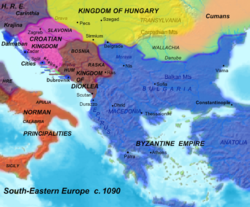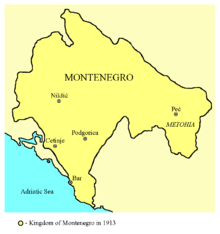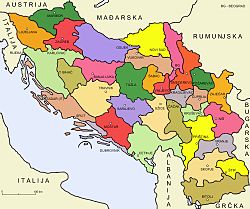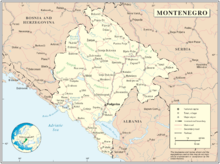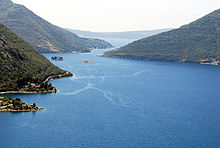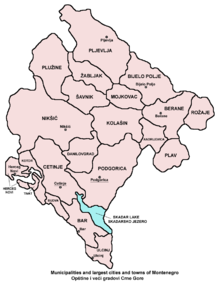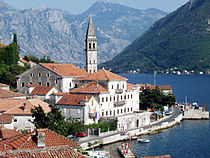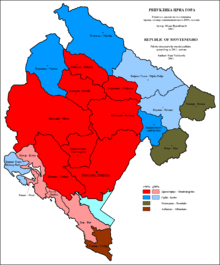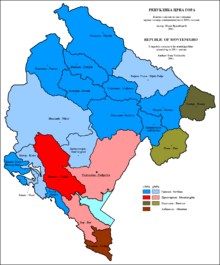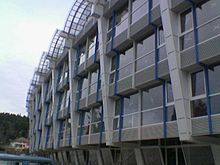- Montenegro
-
This article is about the country in Europe. For other uses, see Montenegro (disambiguation) and Crna Gora (disambiguation).
Montenegro Црна Гора
Crna Gora

Flag Coat of arms Anthem: Oj, svijetla majska zoro
Montenegrin: Oj, svijetla majska zoro
(Montenegrin Cyrillic: Ој, свијетла мајска зоро)
"Oh, Bright Dawn of May"
Location of Montenegro (Green)in Europe (Dark Grey) — [Legend]
Capital
(and largest city) Podgorica1
Podgorica1
42°47′N 19°28′E / 42.783°N 19.467°EOfficial language(s) Montenegrin Ethnic groups (2011) 44.98% Montenegrins,
28.73% Serbs,
8.65% Bosniaks,
4.91% Albanians,
3.31% Muslims,
0.97% Croats, 8.45% others and unspecified[1]Demonym Montenegrin Government Parliamentary republic - President Filip Vujanović - Prime Minister Igor Lukšić - Speaker of the Parliament Ranko Krivokapić Legislature Parliament Establishment - First independence of Duklja from Byzantine Empire[citation needed] 854[citation needed] - Second independence of Duklja from Byzantine Empire 1042 - Independence of Zeta from Serbian Empire[citation needed] 1360 (de jure)
1356 (de facto)- Independence from Serbia and Montenegro 2006 Area - Total 13,812 km2 (161st)
5,019 sq mi- Water (%) 1.5 Population - 2011 census 625,266 - Density 50/km2 (121st)
115.6/sq miGDP (PPP) 2011 estimate - Total $7.029 billion[2] - Per capita $11,228[2] GDP (nominal) 2010 estimate - Total $4.174 billion[2] - Per capita $6,668 HDI (2011) 0.771[3] (high) (54th) Currency Euro (€)2 ( EUR)Time zone CET (UTC+1) - Summer (DST) CEST (UTC+2) Drives on the right ISO 3166 code ME Internet TLD .me Calling code 382 1 The traditional old capital of Montenegro is Cetinje.
2 Adopted unilaterally; Montenegro is not a formal member of the Eurozone.Montenegro (
 i/ˌmɒntɨˈneɪɡroʊ/ or /ˌmɒntɨˈniːɡroʊ/; or /ˌmɒntɨˈnɛɡroʊ/) Montenegrin: Crna Gora Црна Гора [tsr̩̂ːnaː gɔ̝̌ra] (
i/ˌmɒntɨˈneɪɡroʊ/ or /ˌmɒntɨˈniːɡroʊ/; or /ˌmɒntɨˈnɛɡroʊ/) Montenegrin: Crna Gora Црна Гора [tsr̩̂ːnaː gɔ̝̌ra] ( listen), meaning "Black Mountain") is a country located in Southeastern Europe. It has a coast on the Adriatic Sea to the south-west and is bordered by Croatia to the west, Bosnia and Herzegovina to the northwest, Serbia to the northeast and Albania to the southeast.[4] Its capital and largest city is Podgorica, while Cetinje is designated as the Prijestonica (Пријестоница), meaning the former Royal Capital City.[5]
listen), meaning "Black Mountain") is a country located in Southeastern Europe. It has a coast on the Adriatic Sea to the south-west and is bordered by Croatia to the west, Bosnia and Herzegovina to the northwest, Serbia to the northeast and Albania to the southeast.[4] Its capital and largest city is Podgorica, while Cetinje is designated as the Prijestonica (Пријестоница), meaning the former Royal Capital City.[5]In the 10th century, modern Montenegro was divided into three Slavic principalities: Duklja, roughly corresponding to the southern half, Travunia, the west, and Rascia, the north. In 1042, archon Stefan Vojislav led a revolt that resulted in independence of Duklja and the establishment of the House of Vojislavljević. Duklja reached its zenith under Vojislav's son, Mihailo (1046–81), and his son Bodin (1081–1101).[6] By the 13th century, Zeta had replaced Duklja when referring to the realm, which at the time was part of the Serbian Grand Principality of the Nemanjić dynasty. With the fall of the Serbian Empire in the late 14th century, southern Montenegro came under the rule of the Balsic noble family, then the Crnojevic noble family, and by the 15th century, Zeta was more often referred to as Crna Gora (Venetian: monte negro). A sovereign principality[7] since the Late Middle Ages, Montenegro saw its independence from the Ottoman Empire formally recognized in 1878. From 1918, it was a part of Yugoslavia. On the basis of a referendum held on 21 May 2006, Montenegro declared independence on 3 June of that year.
Montenegro is classified by the World Bank as a middle-income country. Montenegro is a member of the UN, the Organization for Security and Co-operation in Europe, the Council of Europe, the Central European Free Trade Agreement and a founding member of the Union for the Mediterranean. Montenegro is also an official candidate for membership in the European Union[8] and official candidate for membership in NATO.[9]
Etymology
Crna Gora, sometimes transliterated as Tsrna Gora ("Black Mountain"), is used to denote a larger part of Montenegro in the 15th century.[10] It had in the late 14th century only referred to a small strip of land of the Pastrovici, but eventually came to be used for a wider mountainous region after the Crnojević family in Upper Zeta.[10]
The aforementioned region became known as Old Montenegro (Стара Црна Гора/Stara Crna Gora) by the 19th century to distinguish it from the newly acquired territory of Brda (The Highlands). Montenegro further increased its size several times by the 20th century as the result of wars against the Ottomans, which saw the annexation of Old Herzegovina and parts of Metohija and southern Rashka. The nation has changed little since that time, though it lost Metohija and gained the Bay of Kotor.
The country's name in most Western European languages reflects an adaptation of the Italian-Venetian calque monte negro (modern Italian would be monte nero), meaning "black mountain", which probably dates back to the era of Venetian hegemony over the area in the Middle Ages. Other languages, particularly nearby ones, use their own direct translation of the term "black mountain".
The ISO Alpha-2 code for Montenegro is ME and the Alpha-3 Code is MNE.[11]
History
Main article: History of MontenegroAncient times
Pliny[disambiguation needed
 ], Appian and Ptolemy mentioned the Docleatae as living in the maritime region, holding the town of Doclea (old Podgorica). In 9 AD the Romans conquered the region. Slavs colonized the area in the 6th century, and had by the 10th century formed a semi-independent principality called Duklja, that was predominantly tied to Medieval Serbia, and to lesser degree, Byzantium, and Bulgaria.
], Appian and Ptolemy mentioned the Docleatae as living in the maritime region, holding the town of Doclea (old Podgorica). In 9 AD the Romans conquered the region. Slavs colonized the area in the 6th century, and had by the 10th century formed a semi-independent principality called Duklja, that was predominantly tied to Medieval Serbia, and to lesser degree, Byzantium, and Bulgaria.Middle Ages
Main articles: Duklja and Principality of ZetaDuklja gained its independence from the Byzantine Empire in 1042. Over the next few decades, it expanded its territory to neighbouring Rascia and Bosnia and also became recognised as a kingdom. Its power started declining at the end of the 11th century and by 1186, it was conquered by Stefan Nemanja and incorporated into Serbian realm. The newly acquired land, then called Zeta, was governed by the Serbian Nemanjić dynasty. After the Serbian Empire collapsed in the second half of the 14th century, another family (the Balšićs) came to prominence.
In 1421, it was annexed to the Serbian Despotate but after 1455 another noble family from Zeta, the Crnojevićs, ruled Montenegro until 1499, making it the last free monarchy of the Balkans before it fell to the Ottomans, who annexed it to the sanjak of Shkodër. For a short time Montenegro existed as a separate autonomous sanjak in 1514–1528, another version of which existed again between 1597 and 1614.
Ottoman rule and Metropolitanate
Main article: Prince-Bishopric of MontenegroIn the 16th century Montenegro developed a form of unique autonomy within the Ottoman Empire with Montenegrin clans being free from certain restrictions. Nevertheless the Montenegrins refused to accept Ottoman rule and in the 17th century raised numerous rebellions, culminating with the defeat of the Ottomans in the Great Turkish War at the end of that century.
Montenegro became a theocracy led by the Serbian Orthodox Metropolitans, flourishing since the Petrović-Njegoš became the traditional prince-bishops (whose title was "Vladika of Montenegro"). The Venetian Republic introduced governors that meddled in Montenegrin politics; when the republic was succeeded by the Austrian Empire in 1797, the governors were abolished by Prince-Bishop Petar II in 1832. His predecessor Petar I contributed to the unification of Montenegro with the Highlands.
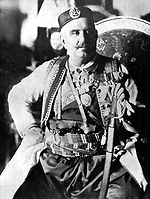 Nicholas I of Montenegro, the only king of Montenegro.
Nicholas I of Montenegro, the only king of Montenegro.
Principality of Montenegro
Main article: Principality of Montenegro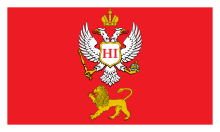 Flag of the Principality of Montenegro.
Flag of the Principality of Montenegro.
Under Nicholas I, the Principality was enlarged several times in the Montenegro-Turkish Wars and was recognised as independent in 1878. Under the rule of Nicholas I, diplomatic relations were established with the Ottoman Empire. Minor border skirmishes excepted, diplomacy ushered in approximately 30 years of peace between the two states until the deposition of Abdul Hamid II.
The political skills of Abdul Hamid and Nicholas I played a major role on the mutually amicable relations.[12] Modernization of the state followed, culminating with the draft of a Constitution in 1905. However, political rifts emerged between the reigning People's Party that supported the process of democratization and union with Serbia and those of the True People's Party who were monarchist.
During this period, one of the biggest in Montenegrin victories over the Ottomans occurred at the Battle of Grahovac. Grand Duke Mirko Petrović, elder brother of Knjaz Danilo, led an army of 7,500 and defeated the numerically superior Ottomans who had 13,000 troops at Grahovac on 1 May 1858. The glory of Montenegrin victory was soon immortalized in the songs and literature of all the South Slavs, in particular the Serbs in Vojvodina, then part of Austria-Hungary. This forced the Great Powers to officially demarcate the borders between Montenegro and Ottoman Empire, de facto recognizing Montenegro's independence.
The first Montenegrin constitution was proclaimed in 1855; it was also known as the Danilo Code.
Kingdom of Montenegro
Main article: Kingdom of MontenegroIn 1910 Montenegro became a Kingdom and as a result of the Balkan wars in 1912 and 1913 (in which the Ottomans lost all Balkan land), a common border with Serbia was established, with Shkodër being awarded to a newly created Albania. In World War I in 1914 Montenegro sided with Serbia against the Central Powers, suffering a full scale defeat to Austria-Hungary in early 1916. In 1918 the Allies liberated Montenegro, which was subsequently merged with Serbia.
Unification and Christmas Uprising
During World War I (1914-1918) Montenegro was allied with the Allied Powers. From 15 January 1916 to October 1918, Montenegro was occupied by Austria-Hungary. During occupation, King Nicholas fled first to Italy and then to France, and the government transferred its operations to Bordeaux. When the Allies liberated Montenegro, the National Assembly of Podgorica (Podgorička skupština, Подгоричка скупштина) was convened and voted to ban the king from returning and to unite the country with the Kingdom of Serbia on 1 December 1918, in violation of the Montenegrin Constitution. In the Christmas Uprising, a large part of the Montenegrin population[citation needed], known as The Greens (Zelenaši), rebelled against this decision to unify with Serbia and, led by their military leader Krsto Zrnov Popović, fought against the pro-unification forces, The whites (Bjelaši). The royal family was rehabilitated in 2011, by the government and today is headed by Crown Prince Nicholas II who has his own foundation.
Kingdom of Yugoslavia
Main article: Kingdom of YugoslaviaIn 1922 Montenegro formally became the "Oblast of Cettinje" of the Zeta Area in the Kingdom of Serbs, Croats and Slovenes, annexing for the first time the coastal areas that were former Albania Veneta. In a successive restructuring, in 1929 it became a part of a larger Zeta Banate of the Kingdom of Yugoslavia that reached the Neretva river.
Nicholas's grandson, the Serb King Alexander I dominated the Yugoslav government. Zeta Banovina was one of nine bannovinas which formed the Kingdom and was named after the Serbian Medieval Principality Zeta. It consisted of the present-day Montenegro and parts of Central Serbia, Croatia and Bosnia.
Kingdom of Montenegro (1941–1944)
Main article: Kingdom of Montenegro (1941–1944)In 1941, Benito Mussolini occupied Montenegro and annexed it to the Kingdom of Italy. The Queen of Italy, Elena of Montenegro influenced her husband Victor Emmanuel III to suggest that Mussolini make Montenegro independent of Yugoslavia. After the spring of 1942, much of the Sandžak region, which was included in the state of Montenegro, was not actually controlled by its government. The area of the Bay of Kotor (the Venetian Cattaro) was annexed to the Dalmatian province of Italy until September 1943. After the departure of the Italians, Montenegro remained under the direct control of German troops, with a terrible and bloody guerrilla war ravaging the area. In December 1944 the German troops withdrew and Josip Broz Tito's Partisans assumed control.
Montenegro within Socialist Yugoslavia
Main article: Socialist Republic of MontenegroMontenegro, like the rest of the Yugoslavia, was liberated by the Yugoslav Partisans in 1944. The first uprising in Axis-occupied Europe happened on 13 July 1941 in Montenegro,[13] when Montenegrins stood up against the fascists and joined Communist partisans. Notable Partisans from Montenegro include Arso Jovanović, Sava Kovačević, Svetozar Vukmanović-Tempo, Milovan Đilas, Peko Dapčević, Vlado Dapčević, Veljko Vlahović, Blažo Jovanović, Pavle Kapičić and Ivan Milutinović. Montenegro became a constituent of the six republics of the communist Socialist Federal Republic of Yugoslavia (SFRY), its capital became Podgorica renamed Titograd in honour of President Josip Broz Tito. After the war, the infrastructure of Yugoslavia was rebuilt, industrialization began and the University of Montenegro was established. Greater autonomy was established until the Socialist Republic of Montenegro ratified a new constitution 1974.
Dissolution of Socialist Yugoslavia and forming of FR Yugoslavia
Main articles: Serbia and Montenegro and Republic of Montenegro (1992–2006)After the dissolution of the SFRY in 1992, Montenegro remained part of a smaller Federal Republic of Yugoslavia along with Serbia.
In the referendum on remaining in Yugoslavia in 1992, the turnout was 66% with 95.96% of the votes cast in favour the federation with Serbia. The referendum was boycotted by the Muslim, Albanian and Catholic minorities as well as the pro-independence Montenegrins. The opponents claimed that the poll was organized under anti-democratic conditions with widespread propaganda from the state-controlled media in favour of a pro-federation vote. There is no impartial report on the fairness of the referendum, as it was unmonitored, unlike in 2006 when European Union observers were present.
During the 1991–1995 Bosnian War and Croatian War, Montenegrin police and military forces joined Serbian troops in the attacks on Dubrovnik, Croatia.[14] These acts of aggression, aimed at acquiring more territory, were characterized by a consistent pattern of gross and systematic violation of human rights.[15]
Montenegrin General Pavle Strugar was convicted for his part in the bombing of Dubrovnik.[16] Bosnian refugees were arrested by Montenegrin police and transported to Serb camps in Foča, where they were subjected to systematic torture and executed.[17][18]
In 1996, Milo Đukanović's government severed ties between Montenegro and the Serbian regime, which was then under Slobodan Milošević. Montenegro formed its own economic policy and adopted the German Deutsche Mark as its currency and subsequently adopted the Euro, although not part of the Eurozone currency union. Subsequent governments have pursued pro-independence policies and political tensions with Serbia simmered despite the political changes in Belgrade. Targets in Montenegro were bombed by NATO forces during Operation Allied Force in 1999, although the extent of these attacks was very limited in both time and area affected.[19]
In 2002, Serbia and Montenegro came to a new agreement regarding continued cooperation and entered into negotiations regarding the future status of the Federal Republic of Yugoslavia. In 2003, the Yugoslav federation was replaced in favour of a more decentralized state union named Serbia and Montenegro.
Independence
The status of the union between Montenegro and Serbia was decided by the referendum on Montenegrin independence on 21 May 2006. A total of 419,240 votes were cast, representing 86.5% of the total electorate. 230,661 votes (55.5%) were for independence and 185,002 votes (44.5%) were against.[20] The 45,659 difference narrowly surpassed the 55% threshold needed to validate the referendum under the rules set by the European Union. According to the electoral commission, the 55% threshold was passed by only 2,300 votes. Serbia, the member-states of the European Union, and the permanent members of the United Nations Security Council all recognised Montenegro's independence.
The 2006 referendum was monitored by five international observer missions, headed by an OSCE/ODIHR team, and around 3,000 observers in total (including domestic observers from CEMI, CEDEM and other organizations). The OSCE/ODIHR joined efforts with the observers of the OSCE Parliamentary Assembly (OSCE PA), the Parliamentary Assembly of the Council of Europe (PACE), the Congress of Local and Regional Authorities of the Council of Europe (CLRAE) and the European Parliament (EP) to form an International Referendum Observation Mission (IROM). The IROM—in its preliminary report—"assessed compliance of the referendum process with OSCE commitments, Council of Europe commitments, other international standards for democratic electoral processes, and domestic legislation." Furthermore, the report assessed that the competitive pre-referendum environment was marked by an active and generally peaceful campaign and that "there were no reports of restrictions on fundamental civil and political rights."
On 3 June 2006, the Montenegrin Parliament declared the independence of Montenegro,[21] formally confirming the result of the referendum. Serbia did not object to the declaration.
Relations between Serbia and Montenegro were strained on 6 September 2007 after Montenegro banned Serbian Orthodox Church leader Bishop Filaret from entering the country. Tension escalated when an adviser to the Serbian prime minister referred to Montenegro as a "quasi-state", prompting Podgorica to seek an apology and lodge a protest with Serbia's government.[22] The Deputy Prime Minister of Serbia, Božidar Đelić, sent a note of apology to Montenegro following the statement made by Serbian Premier's Aide Aleksandar Simic.[23][24]
Geography
Main article: Geography of Montenegro Lake in Durmitor National Park
Lake in Durmitor National Park
Internationally, Montenegro borders Croatia, Bosnia and Herzegovina, Serbia, Kosovo[a], and Albania. It lies between latitudes 41° and 44° N, and longitudes 18° and 21° E.
Montenegro ranges from high peaks along its borders with Serbia and Albania, a segment of the Karst of the western Balkan Peninsula, to a narrow coastal plain that is only one to four miles (6 km) wide. The plain stops abruptly in the north, where Mount Lovćen and Mount Orjen plunge into the inlet of the Bay of Kotor.
Montenegro's large Karst region lies generally at elevations of 1,000 metres (3,280 ft) above sea level; some parts, however, rise to 2,000 m (6,560 ft), such as Mount Orjen (1,894 m/6,214 ft), the highest massif among the coastal limestone ranges. The Zeta River valley, at an elevation of 500 m (1,600 ft), is the lowest segment.
The mountains of Montenegro include some of the most rugged terrain in Europe, averaging more than 2,000 metres in elevation. One of the country's notable peaks is Bobotov Kuk in the Durmitor mountains, which reaches a height of 2,522 metres (8,274 ft). The Montenegrin mountain ranges were among the most ice-eroded parts of the Balkan Peninsula during the last glacial period.
- Longest beach: Velika Plaža, Ulcinj — 13,000 m (8.1 mi)
- Highest peak: Zla Kolata, Prokletije at 2,534 m
- Largest lake: Skadar Lake — 391 km2 (151 sq mi) of surface area
- Deepest canyon: Tara River Canyon — 1,300 m (4,300 ft)
- Biggest bay: Bay of Kotor
- National parks: Durmitor — 390 km2 (150 sq mi), Lovćen — 64 km2 (25 sq mi), Biogradska Gora — 54 km2 (21 sq mi), Skadar Lake — 400 km2 (154 sq mi)
- UNESCO World Heritage sites: Durmitor and Tara River Canyon, old city of Kotor.
Montenegro is a member of the International Commission for the Protection of the Danube River (ICPDR), as more than 2000 square kilometres of the country's territory lie within the Danube catchment area.
Biodiversity
Diversity of geological base, landscape, climate and soil, as well as the very position of Montenegro on the Balkan peninsula and Adriatic sea, created conditions for formation of biological diversity with very high values, that puts Montenegro among biological „hot-spots“ of European and world’s biodiversity. Number of species per area unit Index in Montenegro is 0.837, which is the highest index recorded in all European countries.[25]
Biodiversity outlook:
- Freshwater algea of Montenegro – so far 1200 species and varieties has been described
- Vascular flora of Montenegro has 3250 species. Number of endemics is also high – there are 392 Balkan’s (regional) endemic species, equivalent to over 7% of Montenegrin flora.
- Skadar lake is among the most important areas that are inhabited by the freshwater fish, where 40 species of fish, including species that migrate from marine to freshwater ecosystem, like eel (Anguilla Anguilla), shad (Alossa falax nilotica) etc.
- It is considered that the diversity of marine fish fauna of the Adriatic sea comprise 117 registered families but with low level of endemism. To date, 40 742 marine fish species have been registered in Montenegro which represents 70% of species registered in Mediterranean.
- There are currently 56 species (18 amphebian and 38 reptile species) and 69 subspecies recorded within 38 genera and the list is probably not the final. Mountain regions of Lovćen and Prokletije stand out as particularly hot spots of amphebians and reptiles in Montenegro.
- Out of 526 European bird species 333 are assumed to be regularly present in Montenegro. Out of them, 204 species are nesting in the country.[26]
Administrative divisions
Main article: Municipalities of MontenegroMontenegro is divided into twenty-one municipalities (opština), and two urban municipalities, subdivisions of Podgorica municipality, listed below. Each municipality can contain multiple cities and towns. Historically, the territory of the country was divided into "nahije".
Cities in Montenegro
Main article: List of cities in MontenegroSome of the biggest cities and towns in Montenegro are: City City
PopulationCoat
of armsPodgorica (Capital) 156,169 
Nikšić 57,278 
Bijelo Polje 23,105 Pljevlja 19,622 
Herceg Novi 19,617 
Bar 17,727 
Cetinje 14,166 
Berane 11,193 
Rožaje 9,567 
Government and politics
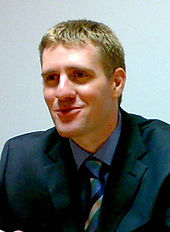 Prime Minister Igor Lukšić
Prime Minister Igor Lukšić Main article: Politics of Montenegro
Main article: Politics of Montenegro Presidential Palace, Cetinje
Presidential Palace, Cetinje See also: Foreign relations of Montenegro and Military of Montenegro
See also: Foreign relations of Montenegro and Military of MontenegroThe Constitution of Montenegro describes the state as a "civic, democratic, ecological state of social justice, based on the reign of Law."[27] Montenegro is an independent and sovereign republic that proclaimed its new constitution on 22 October 2007.
 President Filip Vujanović
President Filip Vujanović
The President of Montenegro (Montenegrin: Predsjednik Crne Gore) is the head of state, elected for a period of five years through direct elections. The President represents the republic abroad, promulgates laws by ordinance, calls elections for the Parliament, proposes candidates for Prime Minister, president and justices of the Constitutional Court to the Parliament. The President also proposes the calling of a referendum to Parliameny, grants amnesty for criminal offences prescribed by the national law, confers decoration and awards and performs other constitutional duties and is a member of the Supreme Defence Council. The official residence of the President is in Cetinje.
The Government of Montenegro (Montenegrin: Vlada Crne Gore) is the executive branch of government authority of Montenegro. The government is headed by the Prime Minister, and consists of the deputy prime ministers as well as ministers.
The Parliament of Montenegro (Montenegrin: Skupština Crne Gore) is a unicameral legislative body. It passes laws, ratifies treaties, appoints the Prime Minister, ministers, and justices of all courts, adopts the budget and performs other duties as established by the Constitution. Parliament can pass a vote of no-confidence on the Government by a simple majority. One representative is elected per 6,000 voters. The present parliament contains 81 seats, with a 47-seat majority currently held by the Coalition for a European Montenegro as a result of the 2009 parliamentary election.
Symbols
An official flag of Montenegro, based on the royal standard of King Nikola I was adopted on 12 July 2004 by the Montenegrin legislature. This royal flag was red with a silver border, a silver coat of arms, and the initials НІ in Cyrillic script (corresponding to NI in Latin script) representing King Nikola I. On the current flag, the border and arms are in gold and the royal cipher in the centre of the arms was replaced with a golden lion.
The national day of 13 July marks the date in 1878 when the Congress of Berlin recognized Montenegro as the 27th independent state in the world[28] and the start of one of the first popular uprisings in Europe against the Axis Powers on 13 July 1941 in Montenegro.
In 2004, the Montenegrin legislature selected a popular Montenegrin traditional song, Oh, Bright Dawn of May, as the national anthem. Montenegro's official anthem during the reign of King Nikola was Ubavoj nam Crnoj Gori (To our beautiful Montenegro).
Military
Main article: Military of MontenegroThe Military of Montenegro is composed of an army, navy, air force, and a special forces component. As of 2009 it is organized as a fully professional standing army under the Ministry of Defence with the aim of protecting and defending Montenegro sovereignty. Montenegro's goal is to eventually join NATO after modernization and reorganization of its military.[29] Future plans for the army are to participate in peacekeeping missions through various UN and NATO efforts such as the International Security Assistance Force.[30]
Economy
Main article: Economy of Montenegro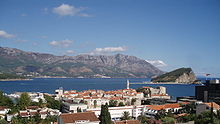 Budva is one of the main tourist destinations
Budva is one of the main tourist destinations
The economy of Montenegro is mostly service-based and is in late transition to a market economy. According to the International Monetary Fund, the nominal GDP of Montenegro was $4.114 billion in 2009. The GDP PPP for 2009 was $6.590 billion, or $10,527 per capita.[31]
GDP grew at an impressive 10.7% in 2007 and 7.5% in 2008.[31] The country entered a recession in 2008 as a part of the global recession, with GDP contracting by 4%. However, Montenegro remained a target for foreign investment, the only country in the Balkans to increase its amount of direct foreign investment.[32] The country is expected to exit the recession in mid-2010, with GDP growth predicted at around 0.5%.[33] However, the significant dependence of the Montenegrin economy on foreign direct investment leaves it susceptible to external shocks and a high export/import trade deficit.
In 2007, the service sector made up for 72.4% of GDP, with industry and agriculture making up the rest at 17.6% and 10%, respectively.[34]
According to Eurostat data, the Montenegrin GDP per capita stood at 40% of the EU average in 2010.[35]
Aluminum and steel production and agricultural processing make up for most of the industrial output.
Tourism is an important contributor to Montenegrin economy. Approximately one million tourists visited Montenegro in 2007, resulting in €480 million of tourism revenue. Tourism is considered the backbone of future economic growth, and government expenditures on infrastructure improvements are largely target towards that goal.
Infrastructure
Main article: Transport in Montenegro Montenegro Airlines is the Montenegrin national airline.
Montenegro Airlines is the Montenegrin national airline.
The Montenegrin road infrastructure is not yet at Western European standards. Despite an extensive road network, no roads are built to full motorway standards. Construction of new motorways is considered a national priority, as they are important for uniform regional economic development and the development of Montenegro as an attractive tourist destination.
Current European routes that pass through Montenegro are E65 and E80.
The backbone of the Montenegrin rail network is the Belgrade - Bar railway. This railway intersects with Nikšić – Tirana (Albania) at Podgorica; however, it is not used for passenger service.
Montenegro has two international airports, Podgorica Airport and Tivat Airport. The two airports served 1.1 million passengers in 2008. Montenegro Airlines is the flag carrier of Montenegro.
The Port of Bar is Montenegro's main seaport. Initially built in 1906, the port was almost completely destroyed during World War II, with reconstruction beginning in 1950. Today, it is equipped to handle over 5 million tons of cargo annually, though the breakup of the former Yugoslavia and the size of the Montenegrin industrial sector has resulted in the port operating at a loss and well below capacity for several years. The reconstruction of the Belgrade-Bar railway and the proposed Belgrade-Bar motorway are expected to bring the port back up to capacity.
Tourism
Main article: Tourism in MontenegroMontenegro has both a picturesque coast and a mountainous northern region. The country was a well-known tourist spot in the 1980s. Yet, the Yugoslav wars that were fought in neighbouring countries during the 1990s crippled the tourist industry and destroyed the image of Montenegro as a tourist destination.
The Montenegrin Adriatic coast is 295 km (183 mi) long, with 72 km (45 mi) of beaches, and with many well-preserved ancient old towns. National Geographic Traveler (edited once in decade) features Montenegro among the "50 Places of a Lifetime", and Montenegrin seaside Sveti Stefan was used as the cover for the magazine.[36] The coast region of Montenegro is considered one of the great new "discoveries" among world tourists. In January 2010, The New York Times ranked the Ulcinj South Coast region of Montenegro, including Velika Plaza, Ada Bojana, and the Hotel Mediteran of Ulcinj, as among the "Top 31 Places to Go in 2010" as part of a worldwide ranking of tourism destinations.[37] Montenegro was also listed in "10 Top Hot Spots of 2009" to visit by Yahoo Travel, describing it as "Currently ranked as the second fastest growing tourism market in the world (falling just behind China)".[38] It is listed every year by prestigious tourism guides like Lonely Planet as top touristic destination along with Greece, Spain and other world touristic places[39][40]
It was not until the 2000s that the tourism industry began to recover, and the country has since experienced a high rate of growth in the number of visits and overnight stays. The Government of Montenegro has set the development of Montenegro as an elite tourist destination a top priority. It is a national strategy to make tourism a major contributor to the Montenegrin economy. A number of steps were taken to attract foreign investors. Some large projects are already under way, such as Porto Montenegro, while other locations, like Jaz Beach, Buljarica, Velika Plaža and Ada Bojana, have perhaps the greatest potential to attract future investments and become premium tourist spots on the Adriatic.
-
Miriste Beach, Herceg Novi
-
A view of Sveti Stefan island in the Budva municipality.
-
Biogradska Gora, one of the few remaining European rain forests and a national park in Kolašin.
-
Tara River Canyon, longest canyon in Europe and the second-longest in the world.
Demographics
Main articles: Demographics of Montenegro and Demographic history of MontenegroHistorical populations Year Pop. ±% 1900 311,564 — 1909 317,856 +2.0% 1921 311,341 −2.0% 1931 360,044 +15.6% 1948 377,189 +4.8% 1953 419,873 +11.3% 1961 471,894 +12.4% 1971 529,604 +12.2% 1981 584,310 +10.3% 1991 615,035 +5.3% 2003 620,145 +0.8% 2011 625,266 +0.8% Ethnic structure
According to the 2003 census, Montenegro has 620,145 citizens. If the methodology used up to 1991 had been adopted in the 2003 census, Montenegro would officially have recorded 673,094 citizens. The results of the 2011 census show that Montenegro has 620,029 citizens.[41]
When the 2003 census was taken Montenegro was a non-national civic state. In the meantime, the Constitution was changed, hence it now recognizes the major ethnic groups: Montenegrins (Crnogorci), Serbs (Srbi), Bosniaks (Bošnjaci), Muslims (Muslimani), Albanians (Albanci - Shqiptarët) and Croats (Hrvati). Thus, the number of "Montenegrins" and "Serbs" fluctuates wildly from census to census due to changes in how people experience, or choose to express, their identity.[42]
Ethnic composition according to the 2011 official[citation needed] data:
Number % Total 620,029 100 Montenegrins 278,865 44.98 Serbs 178,110 28.73 Bosniaks 53,605 8.65 Albanians 30,439 4.91 Muslims by nationality 20,537 3.31 Roma 6,251 1.01 Croatians 6,021 0.97 Serbo-Montenegrins 2,103 0.34 Egyptians 2,054 0.33 Montenegrins-Serbs 1,833 0.30 Yugoslavs 1,154 0.19 Russians 946 0.15 Macedonians 900 0.15 Bosnians 427 0.07 Slovenians 354 0.06 Hungarians 337 0.05 Muslim-Montenegrins 257 0.04 Gorani people 197 0.03 Muslim-Bosniaks 183 0.03 Bosniaks-Muslims 181 0.03 Montenegrin-Muslims 175 0.03 Italians 135 0.02 Germans 131 0.02 Turks 104 0.02 regional qualification 1.202 0.19 without declaration 3.0170 4.87 other 3.358 0.54 Linguistic structure
Most citizens speak the Serbian language of the Iyekavian dialect. However, as of 2004 moves for an independent Montenegrin language were promoted and with the new 2007 Constitution it became Montenegro's prime official language. Next to it, Serbian, Bosnian, Albanian and Croatian are recognized in usage. All of these languages except for Albanian are mutually intelligible. According to the 2011 census, the following languages are spoken in the country[41]:
Number % Total 620.029 100 Serbian 265,895 42.88 Montenegrin 229,251 36.97 Bosnian 33,077 5.33 Albanian 32,671 5.27 Serbo-Croatian 12,559 2.03 Roma 5,169 0.83 Bosniak 3,662 0.59 Croatian 2,791 0.45 Russian 1,026 0.17 Serbo-Montenegrin 618 0.10 Macedonian 529 0.09 Montenegrin-Serbian 369 0.06 Hungarian 225 0.04 Croatian-Serbian 224 0.04 English 185 0.03 German 129 0.02 Slovene 107 0.02 Romanian 101 0.02 mother tongue 3.318 0.54 regional languages 458 0.07 without declaration 24.748 3.99 other 2.917 0.47 Religious structure
Most Montenegrin inhabitants are Orthodox Christians, followers of the Serbian Orthodox Church's Metropolitanate of Montenegro and the Littoral and the Montenegrin Orthodox Church. The religious institutions all have guaranteed rights and are separate from the state. There is a sizeable number of Sunni Muslims Montenegrins that maintain their own Islamic Community of Montenegro. There is also a small Roman Catholic population, divided between the Archdiocese of Antivari headed by the Primate of Serbia and the Diocese of Kotor that is a part of the Church of Croatia. Religious determination according to the 2011 census[41]:
Number % Total 620.029 100 Eastern Orthodox 446.858 72.07 Islam/ Muslims 118.477
(99.038 Islam, 19.439 Muslims)19.11
(15.97 Islam, 3.14 Muslims)Catholics 21.299 3.44 Atheism 7.667 1.24 Christians 1.460 0.24 Adventists 894 0.14 Agnostics 451 0.07 Jehovah's Witnesses 145 0.02 Protestants 143 0.02 Buddhists 118 0.02 other 6.337 1.02 without declaration 16.180 2.61 - Note: In the 2011 census, there are two separate columns for the adherents of the Islam, one is called Islam, the other Muslims.
Education
Main article: Education in Montenegro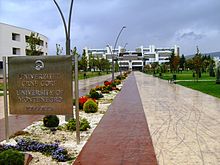 Main building of The University of Montenegro.
Main building of The University of Montenegro.
Education in Montenegro is regulated by the Montenegrin Ministry of Education and Science.
Education starts in either pre-schools or elementary schools. Children enroll in elementary schools (Montenegrin: Osnovna škola) at the age of 6; it lasts 9 years. The students may continue their secondary education (Montenegrin: Srednja škola), which lasts 4 years (3 years for trade schools) and ends with graduation (Matura). Higher education lasts with a certain first degree after 3 to 6 years. There is one public University (University of Montenegro) and two private (University "Mediterranean" and UDG).
Elementary education
Elementary education in Montenegro is free and compulsory for all the children between the ages of 6 and 14.
Secondary education
Secondary schools are divided in three types, and children attend one depending on choice and primary school grades:
- Gymnasium (Gimnazija), lasts for four years and offers a general, broad education. It is a preparatory school for university, and hence the most academic and prestigious.
- Professional schools (Stručna škola) last for three or four years and specialize students in certain fields which may result in them attending college; professional schools offer a relatively broad education.
- Vocational schools (Zanatska škola) last for three years and focus on vocational education (e.g., joinery, plumbing, mechanics) without an option of continuing education after three years.
Tertiary education
Tertiary level institutions are divided into "Higher education" (Više obrazovanje) and "High education" (Visoko obrazovanje) level faculties.
- Colleges (Fakultet) and art academies (akademija umjetnosti) last between 4 and 6 years (one year is two semesters long) and award diplomas equivalent to a Bachelor of Arts or a Bachelor of Science degree.
Higher schools (Viša škola) lasts between two and four years.
Post-graduate education
Post-graduate education (post-diplomske studije) is offered after tertiary level and offers Masters' degrees, PhD and specialization education.
Culture
Main article: Culture of MontenegroThe Church of Our Lady of the Rocks, an example of Roman Catholic architecture in Montenegro.
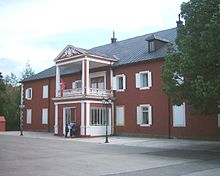 National Museum of Montenegro in Cetinje (Former Palace of King Nikola I)
National Museum of Montenegro in Cetinje (Former Palace of King Nikola I)
The culture of Montenegro has been shaped by a variety of influences throughout history. The influence of Orthodox, Slavonic, Central European, Islamic, and seafaring Adriatic cultures (notably parts of Italy, like the Republic of Venice) have been the most important in recent centuries.
Montenegro has many significant cultural and historical sites, including heritage sites from the pre-Romanesque, Gothic and Baroque periods. The Montenegrin coastal region is especially well known for its religious monuments, including the Cathedral of Saint Tryphon in Kotor[43] (Cattaro under the Venetians), the basilica of St. Luke (over 800 years), Our Lady of the Rocks (Škrpjela), the Savina Monastery and others. Montenegro's medieval monasteries contain thousands of square metres of frescos on their walls.
The traditional folk dance of the Montenegrins is the Oro, a circle dance that involves dancers standing on each other's shoulders in a circle while one or two dancers are dancing in the middle.
The first literary works written in the region are ten centuries old, and the first Montenegrin book was printed five hundred years ago. The first state-owned printing press was located in Cetinje in 1494, where the first South Slavic book, Oktoih, was printed the same year. Ancient manuscripts, dating from the thirteenth century, are kept in the Montenegrin monasteries.[44]
Montenegro's capital Podgorica and the former royal capital of Cetinje are the two most important centres of culture and the arts in the country.
Ethical beliefs
A very important dimension of Montenegrin culture is the ethical ideal of Čojstvo i Junaštvo, "Humaneness and Gallantry".[45][46]
Sport
Main article: Sport in MontenegroThe most popular sports in Montenegro are team sports, in particular football, basketball, water polo, volleyball and handball. Other relatively important sports include boxing, judo, karate, athletics, table tennis, and chess.
Previously, all National Teams were known as Yugoslavian national teams, as Montenegro was part of Yugoslavia. On 24 March 2007, the Montenegrin national football team came from behind to win its first ever fixture, 2-1, in a friendly game against Hungary at the Podgorica Stadium.[47] The main football club in Montenegro is FK Budućnost Podgorica from capital Podgorica.[48] At ther 119th Session in Guatemala City in July 2007, the International Olympic Committee granted recognition and membership to the newly formed Montenegrin National Olympic Committee. Montenegro made its debut at the 2008 Summer Olympics in Beijing.[49] Montenegro hosted together with Serbia the EuroBasket 2005 championships.[50]
Water polo is one of the most popular sports in the country. Montenegro won the European Championships in Malaga, Spain on 13 July 2008 over Serbia 6-5 in a game that was tied 5–5 after four quarters.[51] This was Montenegro's first major international competition for which they had to qualify through two LEN tournaments. Montenegro won the gold medal at the 2009 FINA Men's Water Polo World League which was held in Podgorica.[52] Montenegrin team PVK Primorac from Kotor became a champion of Europe at the LEN Euroleague 2009 in Rijeka, Croatia. Montenegro’s first division in water polo consists of six clubs, four of them with an annual budget of one million Euros and more — VK Primorac Kotor (2007 and 2008 Montenegro champions), VK Jadran Herceg Novi (2006 champions of Serbia-Montenegro), VK Budvanska Rivijera Budva, VK Cattaro. Montenegro's water polo Olympic team finished fourth overall at the 2008 Olympic Games in Beijing.
Cuisine
Main article: Montenegrin cuisineMontenegrin cuisine is a result of Montenegro's long history. It is a variation of Mediterranean and Oriental. The most influence is from Italy, Turkey, Byzantine Empire/Greece, and as well from Hungary. Montenegrin cuisine also varies geographically; the cuisine in the coastal area differs from the one in the northern highland region. The coastal area is traditionally a representative of Mediterranean cuisine, with seafood being a common dish, while the northern represents more the Oriental.
In popular culture
The first official international representation of Montenegro as an independent state was in Miss World 2006, held on 30 September 2006 in Warsaw, Poland. Ivana Knežević from the city of Bar was the first Miss Montenegro at any international beauty pageant.[53] Both Montenegro and Serbia competed separately in this pageant for the first time after the state union came to an end.
Part of the 2006 James Bond film Casino Royale is set in Montenegro,[54] although most of the filming was done in the Czech Republic.
Nero Wolfe, the eccentric fictional detective created by American writer Rex Stout, is Montenegrin by birth.[55] One Nero Wolfe novel, The Black Mountain, takes place in Tito-era Montenegro.
The setting for Franz Lehár's 1905 operetta The Merry Widow is the Paris embassy of the Grand Duchy of Pontevedro. Pontevedro is a fictionalized version of Montenegro and several of the characters were loosely based on actual Montenegrin nobility.
This location is featured in The Brothers Bloom, where Bloom moves to escape his brother in the beginning, and in the end, where he ends up living.
Montenegrin holidays
Holidays Date Name Notes 1 January New Year's Day (non-working holiday) 7 January Orthodox Christmas (non-working) 2 April Orthodox Good Friday Date for 2010 only 4 April Orthodox Easter Date for 2010 only 5 April Orthodox Easter Monday Date for 2010 only 1 May Labor Day (non-working) 9 May Victory Day 21 May Independence Day (non-working) 13 July Statehood Day (non-working) See also
Notes
a. ^ Kosovo is the subject of a territorial dispute between the Republic of Serbia and the self-proclaimed Republic of Kosovo. The latter declared independence on 17 February 2008, while Serbia claims it as part of its own sovereign territory. Its independence is recognised by 85 UN member states. References
- ^ "Census of Population, Households and Dwellings in Montenegro 2011". Monstat. http://www.monstat.org/userfiles/file/popis2011/saopstenje/saopstenje(1).pdf. Retrieved 12 July 2011.
- ^ a b c "Montenegro". International Monetary Fund. http://www.imf.org/external/pubs/ft/weo/2011/02/weodata/weorept.aspx?pr.x=66&pr.y=14&sy=2009&ey=2016&scsm=1&ssd=1&sort=country&ds=.&br=1&c=943&s=NGDPD%2CNGDPDPC%2CPPPGDP%2CPPPPC%2CLP&grp=0&a=. Retrieved 21 September 2011.
- ^ "Human Development Report 2011". United Nations. 2011. http://hdr.undp.org/en/media/HDR_2011_EN_Table1.pdf. Retrieved 5 November 2011.
- ^ "Google Maps". Maps.google.co.uk. 1 January 1970. http://maps.google.co.uk/maps?hl=en&tab=wl&q=goo. Retrieved 11 September 2010.
- ^ Basic data of Montenegro[dead link]
- ^ "Montenegro.org". Montenegro.org. http://www.montenegro.org/duklja.html. Retrieved 11 September 2010.
- ^ "Montenegro.org". Montenegro.org. 24 April 1997. http://www.montenegro.org/balsic.html. Retrieved 11 September 2010.
- ^ Crna Gora od danas kandidat.
- ^ pcnen.com. "Crna Gora u predvorju NATO-a". Pcnen.com. http://pcnen.com/detail.php?module=15&news_id=869. Retrieved 11 September 2010.
- ^ a b Fine, 1994, p. 532
- ^ ISO 3166-1 Newsletter No. V-12, Date: 26 September 2006
- ^ Uğur Özcan, II. Abdülahmid Dönemi Osmanlı Karadağ Siyasi İlişkileri (Political relations between the Ottoman Empire and Montenegro in the Abdul Hamid II era)Dissertation Thesis, Suleyman Demirel University Institute of Social Science, Isparta 2009
- ^ "Prema oceni istoričara, Trinaestojulski ustanak bio je prvi i najmasovniji oružani otpor u porobljenoj Evropi 1941. godine."
- ^ "Croatiatraveller.com". Croatiatraveller.com. http://www.croatiatraveller.com/southern_dalmatia/Dubrovnik/bombing.html. Retrieved 11 September 2010.
- ^ "UN.org". United Nations. http://www.un.org/documents/ga/res/47/a47r121.htm. Retrieved 11 September 2010.
- ^ YIHR.org[dead link]
- ^ "UWE.ac.uk". Ess.uwe.ac.uk. http://www.ess.uwe.ac.uk/comexpert/ANX/VIII-03.htm#III.A.25. Retrieved 11 September 2010.
- ^ "Porodica Nedžiba Loje o Njegovom Hapšenju i Deportaciji 1992". Godine Bosnjaci.net
- ^ "Russia pushes peace plan". BBC. 29 April 1999. http://news.bbc.co.uk/2/hi/europe/331036.stm.
- ^ "Montenegro vote result confirmed". BBC News. 23 May 2006. http://news.bbc.co.uk/2/hi/europe/5007364.stm. Retrieved 11 September 2010.
- ^ "Montenegro declares independence". BBC News. 4 June 2006. http://news.bbc.co.uk/1/hi/world/europe/5043462.stm. Retrieved 11 September 2010.
- ^ english@peopledaily.com.cn (8 September 2007). "People.com.cn". People's Daily. http://english.people.com.cn/90001/90777/6257839.html. Retrieved 11 September 2010.
- ^ "MFA.gov.rs". MFA.gov.rs. http://www.mfa.gov.rs/Policy/Minister/100907_e.html. Retrieved 11 September 2010.
- ^ "Crna Gora tražila javno izvinjenje zbog afere "kvazidržava"". Vijesti. http://www.vijesti.cg.yu/arhiva.php?akcija=vijest&id=246805.[dead link]
- ^ Environment Reporter 2010. Environmental Protection Agency of Montenegro. 2011. pp. 22.
- ^ Environment Reporter 2010. Environmental Protection Agency of Montenegro. 2011. pp. 22–23.
- ^ "Ustav Crne Gore" (PDF). http://www.skupstina.me/cms/site_data/ustav/Ustav%20Crne%20Gore.pdf. Retrieved 11 September 2010.
- ^ "President Vujanovic’s Closing Speech at the Crans Montana Forum". Predsjednik.me. 21 February 2006. http://www.predsjednik.me/print.php?id=983&jezik=2. Retrieved 11 September 2010.
- ^ "Cilj Crne Gore članstvo u NATO". Pobjeda.me. 30 April 2008. http://www.pobjeda.me/citanje.php?datum=2009-06-13&id=165755. Retrieved 11 September 2010.
- ^ "Spremaju se za Avganistan". Vijesti.me. http://www.vijesti.me/index.php?id=302794. Retrieved 11 September 2010.
- ^ a b "5. Report for Selected Countries and Subjects". April 2011. http://www.imf.org/external/pubs/ft/weo/2011/01/weodata/weorept.aspx?pr.x=69&pr.y=3&sy=2008&ey=2011&scsm=1&ssd=1&sort=country&ds=.&br=1&c=943&s=NGDPD%2CPPPGDP%2CPPPPC&grp=0&a=.
- ^ FDI falls across West Balkans, except Montenegro. Reuters India 10 December 2009. Retrieved 14 December 2009.
- ^ Montenegro's leader sees slow economic recovery. Balkans.com Business News 9 December 2009. Retrieved 14 December 2009.
- ^ "Montenegro at a glance". http://devdata.worldbank.org/AAG/mne_aag.pdf.
- ^ "GDP per capita in PPS". Eurostat. http://epp.eurostat.ec.europa.eu/cache/ITY_PUBLIC/2-21062011-AP/EN/2-21062011-AP-EN.PDF. Retrieved 21 June 2011.
- ^ "50 Places of a Lifetime". Blogs.nationalgeographic.com. 17 September 2009. http://blogs.nationalgeographic.com/blogs/intelligenttravel/2009/09/50-places-of-a-lifetime-1.html. Retrieved 11 September 2010.
- ^ "The 31 Places to Go in 2010" – New York Times
- ^ "10 Top Hot Spots of 2009 by Yahoo Travel". Travel.yahoo.com. http://travel.yahoo.com/p-interests-24784785. Retrieved 11 September 2010.
- ^ Holger Leue. "Where to go in June". Lonely Planet. http://www.lonelyplanet.com/france/travel-tips-and-articles/42/50792. Retrieved 11 September 2010.
- ^ "America Sending their Best Adventure Racers to Montenegro". Adventureworldmagazineonline.com. 4 June 2010. http://www.adventureworldmagazineonline.com/news/america-sending-their-best-adventure-racers-to-montenegro/. Retrieved 11 September 2010.
- ^ a b c "2011 Montenegrin Census" (in English and Montenegrin). Monstat. http://www.monstat.org/userfiles/file/popis2011/saopstenje/saopstenje(1).pdf. Retrieved 12 July 2011.
- ^ "Montenegrin Census' from 1909 to 2003". Njegos.org. 23 September 2004. http://www.njegos.org/census/index.htm. Retrieved 11 September 2010.
- ^ Aleksandar Šestović. "Kotor". Kotoronline.com. http://www.kotoronline.com. Retrieved 11 September 2010.
- ^ Milan Nikolic. "History of Montenegro: Crnojevic Rule". Montenet. http://www.montenet.com/history/crnoje.htm. Retrieved 11 September 2010.
- ^ "Чојство и јунаштво старих Црногораца, Цетиње 1968. 3–11". Web.f.bg.ac.rs. http://web.f.bg.ac.rs/print.php?sid=58&id=1014&zid=28&kid=338. Retrieved 11 September 2010.
- ^ Oblikovanje crnogorske nacije u doba petrovica njegosa, "Cojstvo je osobeno svojstvo Crnogoraca, koje su uzdigli u najvecu vrlinu i uzor."[dead link]
- ^ Montenegro take a bow at victory[dead link]
- ^ "Budućnost uz velikane". Fkbuducnost.co.me. http://www.fkbuducnost.co.me/index.php?option=com_content&view=article&id=153:budunost-uz-velikane&catid=19:vijesti. Retrieved 11 September 2010.
- ^ "Podignuta crnogorska zastava u olimpijskom selu". Cokcg.org. http://www.cokcg.org/podignutacz.htm. Retrieved 11 September 2010.
- ^ "EuroBasket History — The 21st Century". Eurobasket2009.org. http://www.eurobasket2009.org/en/cid_toT,ovGDH2EaLKL67XnPo2.pageID_xRieo1shHQsy6cAXDHuYS0.compID_qMRZdYCZI6EoANOrUf9le2.season_2009.coid_2Gtpv2fDGhExqVblrCVL83.articleMode_on.html. Retrieved 11 September 2010.
- ^ Radio-televizija Vojvodine, www.rtv.rs. "Crna Gora šampion Evrope". Rtv.rs. http://www.rtv.rs/sr/vesti/sport/vaterpolo/2008_07_13/vest_72614.jsp. Retrieved 11 September 2010.
- ^ Montenegro Wins World League[dead link]
- ^ "Warsaw (MissWorld-2006-Warsaw". Sfmission.com. http://www.sfmission.com/cgi-bin/gallery/imageFolio.cgi?action=view&link=Poland/Warsaw&image=MissWorld-2006-Warsaw.jpg&img=&tt=. Retrieved 11 September 2010.
- ^ Sonypictures.com, James Bond Casino Royal official web site, "About"
- ^ McAleer, John, Rex Stout: A Biography, 1977, Little, Brown and Company; ISBN 0-316-55340-9 pp. 403, 556, 566
a. ^ Kosovo is the subject of a territorial dispute between the Republic of Serbia and the self-proclaimed Republic of Kosovo. The latter declared independence on 17 February 2008, while Serbia claims it as part of its own sovereign territory. Its independence is recognised by 85 UN member states. Further reading
- Realm of the Black Mountain: A History of Montenegro by Elizabeth Roberts (Hurst & Co, 2007) ISBN 978-1-85065-868-9
- Montenegro: The Divided Land by Thomas Fleming (2002) ISBN 0-9619364-9-5
- The Rough Guide to Montenegro by Norm Longley (2009) ISBN 978-1-85828-771-3
- The National Question in Yugoslavia: Origins, History, Politics Cornell University Press, by Ivo Banac (1984) ISBN 0-8014-9493-1
- A History of Montenegro by Francis Seymour Stevenson (2002) ISBN 978-1-4212-5089-2
- Montenegro: A Modern History by Kenneth Morrison (2009) ISBN 978-1-84511-710-8
- II. Abdulhamid Dönemi Osmanlı Karadağ Siyasi İlişkileri [Political relations between the Ottoman Empire and Montenegro in the Abdul Hamid II era] by Uğur Özcan (2009) Phd. Dissertation Thesis, Suleyman Demirel University Institute of Social Science, Isparta 2009
External links
- Official website
- Interactive PhotoGallery from Montenegro – 2000 photos
- Montenegro entry at The World Factbook
- Montenegro at the Open Directory Project
- Wikimedia Atlas of Montenegro
- Montenegro travel guide from Wikitravel
 OpenStreetMap has geographic data related to Montenegro
OpenStreetMap has geographic data related to Montenegro
Categories:- Montenegro
- Countries of the Mediterranean Sea
- European countries
- Slavic countries
- Serbo-Croatian-speaking countries
- Republics
- Liberal democracies
- States and territories established in 2006
- Balkans
- Member states of the Union for the Mediterranean
- Member states of the United Nations
Wikimedia Foundation. 2010.

![Location of Montenegro (Green)in Europe (Dark Grey) — [Legend]](/pictures/enwiki/50/250px-Europe-Montenegro.svg.png)
